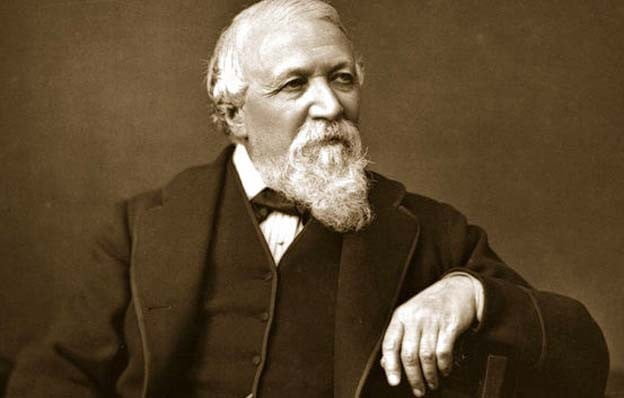Porphyria’s Lover is a dramatic monologue by the Victorian poet Robert Browning. It tells the story of a man who, driven by his obsessive love for his beloved Porphyria, commits a shocking and violent act. The poem is renowned for exploring themes like love, power, madness, and the Victorian era’s social constraints. The poem’s grim narrative and the speaker’s chilling rationalisation of his actions heighten its dramatic and psychological intensity.
Summary
The poem opens with the speaker sitting alone in a dark, cold cottage during a stormy night. He describes the weather as wild and windy, creating a sense of foreboding and tension. Suddenly, Porphyria arrives, and her presence brings warmth and light into the darkened room. She is described as beautiful and radiant, with a passionate and loving demeanour.
Porphyria confesses her love for the speaker and desires to be with him forever. As the speaker describes Porphyria’s actions, it becomes clear that she is of a higher social standing than him. Despite this, she sits beside him, leans her shoulder against his, and declares her love. She puts his arm around her waist and pulls his head down to rest against her shoulder, signalling she controls their interaction.
The speaker then describes the realisation of Porphyria’s love for him and a wish that the moment could last forever. However, he believes Porphyria will eventually succumb to societal pressures and will not fully commit to their love. Fearing the loss of her love, the speaker decides to preserve the moment by killing Porphyria.
In a shocking twist, the speaker strangles Porphyria with her own hair, effectively freezing her in the moment of her greatest happiness. After the murder, the poem notes how the speaker opens Porphyria’s eyes and unwinds her hair from around her neck, admiring how she looked just as she did before her death, only now she is his entirely and forever. The speaker then spends the whole night sitting with Porphyria’s corpse, justifying his actions by insisting that she felt no pain.
He ends the poem by mentioning that God has not spoken out against his deed, leaving the reader with moral ambiguity and unease. The poem ends with the speaker reflecting on the peaceful expression on Porphyria’s face, suggesting that he believes he has done her a favour by sparing her from the pain and suffering of life.

Dramatic Monologue
Browning is often credited with popularising the dramatic monologue, and Porphyria’s Lover is a quintessential example. It allows for in-depth characterisation and an intimate exploration of the speaker’s psyche while revealing only the speaker’s perspective. The poet gives voice to the unnamed male speaker who recounts the events of the evening. Through his words, Browning reveals the speaker’s obsessive love for Porphyria and his desire to possess her completely. The speaker’s actions are driven by a toxic combination of jealousy and possessiveness, leading him to commit a violent and irreversible act.
Psychological Depth
Browning delves into the psyche of the speaker, offering a portrayal of mental instability and obsessive love that was unusual for its time, exploring the twisted logic and rationalisations behind his actions. The speaker’s sense of entitlement and belief that he is acting out of love underscores the complexities of human nature and the dark depths of obsession. Browning skillfully portrays the psychological turmoil of the speaker, blurring the lines between love and madness. The calm and rational tone used by the speaker to describe his actions adds to the chilling nature of this psychological portrait.
Themes of Possession and Power
The speaker’s actions reflect a desire for absolute possession and control over Porphyria, which ultimately leads to her death. This aligns with Victorian concerns over ownership within relationships and the power dynamics between genders.
Use of Irony
Browning employs irony in the way the speaker rationalises his actions as a loving act when, in fact, it’s a violent assertion of control. The speaker frames the murder as a means to preserve their perfect moment of unity, ironically perverting the idea of love.
Ambiguity and Interpretation
Porphyria’s Lover is open to multiple interpretations, inviting readers to grapple with its complex themes and moral implications. Some readers may sympathise with the speaker’s sense of desperation and longing for love, while others may condemn his actions as morally reprehensible. Browning’s use of ambiguity and irony adds layers of complexity to the poem, challenging readers to confront their assumptions and judgments. The poem leaves the reader to grapple with complex themes of morality, sanity, passion, and the social context that might contribute to the narrator’s ultimate decision.
Imagery
Browning’s use of vivid imagery, such as the storm outside contrasting with the warmth brought by Porphyria, symbolically represents the tumultuous nature of the relationship and the inner turmoil of the speaker.
Gender Dynamics
The poem also offers a critique of Victorian gender roles and power dynamics. Porphyria’s submission to the speaker’s desires, coupled with the speaker’s ultimate act of violence, reflects broader societal attitudes towards women and their role in relationships. Browning’s portrayal of Porphyria as a passive object of desire highlights the oppressive nature of gender norms and the consequences of patriarchal control.
Narrative Technique
Browning’s use of a dramatic monologue allows readers to enter the speaker’s mind and experience the events of the evening from his perspective. This narrative technique creates a sense of intimacy and immediacy, drawing readers into the psychological drama unfolding within the poem. Through the speaker’s words, Browning invites readers to confront uncomfortable truths about human nature and the darker aspects of love and desire. The tight rhyming scheme and consistent meter contrast with the chaotic and disordered emotional content, heightening the tension between form and meaning.
Subversion of Romantic Ideals
At its core, the poem subverts traditional romantic ideals by presenting a narrator who takes extreme measures to attain a perverse form of eternal love, suggesting a critique of idealised perceptions of romance.
Victorian Context
The poem reflects Victorian anxieties regarding women’s roles, sexual autonomy, and the potential destructiveness of repressed desires. By presenting a female character who seemingly transgresses social norms, it raises questions about the era’s gender expectations.
Porphyria’s Lover is a haunting and disturbing poem that delves into the depths of human psychology, exploring themes of love, obsession, and control. Browning uses dramatic irony to reveal the speaker’s twisted mindset and to critique the oppressive gender dynamics of Victorian society. Through its psychological depth, rich imagery, and provocative themes, the poem offers a profound meditation on the darker aspects of human nature and the complexities of romantic relationships. The poem raises questions about the nature of love, power, and morality, leaving readers to grapple with its unsettling implications. Browning’s skilful craftsmanship and nuanced portrayal of the speaker make Porphyria’s Lover a timeless work of literature that continues to provoke thought and discussion.




























